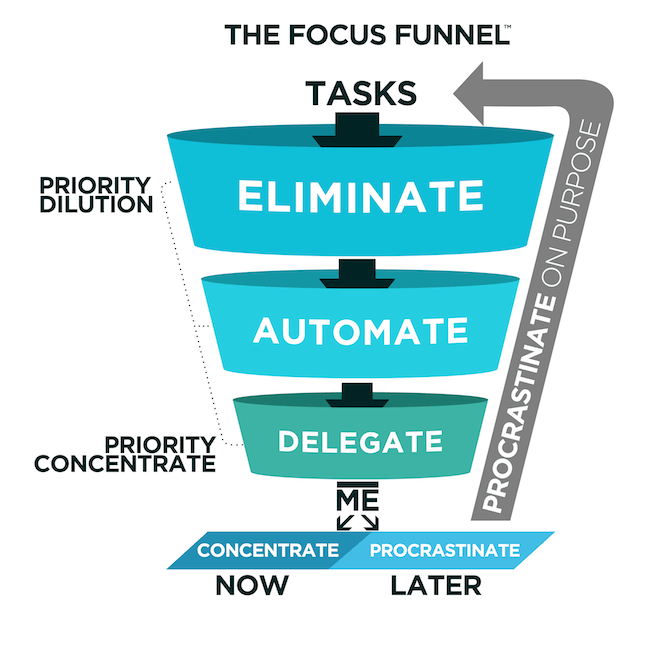When you learn to think like the top one percent of people who get things done, procrastination is a virtue on par with patience — and an essential part of your time management strategy.
“Automation is to your time exactly what compounding interest is to your money.” -Rory Vaden
The Cheat Sheet:
- Everything you know about time management is wrong.
- How can you use your time in a way today that creates more time tomorrow?
- Time management is as emotional as it is logical.
- Learn the five permissions you need to give yourself in order to achieve more in less time.
- Find out how the 30x Rule can give you a 733% ROTI (Return On Time Invested)!
- And so much more…
[aoc-subscribe]
When you’re struggling with the need to check a thousand things off of a frantic to-do list and dealing with a limited number of hours in the day, it probably seems like giving in to procrastination is the last thing you’d want to do. After all, what greater archenemy to productivity is there than the urge to indefinitely put off something you don’t feel like doing?
Yet in episode 424 of The Art of Charm, entrepreneur and New York Times bestselling author Rory Vaden tells us that’s exactly what highly productive people are doing; they procrastinate on purpose to maximize the management of their time, and they multiply the effectiveness of the hours in their day — effectively creating time in the same way that wealthy people create money. Listen in and find out why the time management strategies of yesterday don’t work for the time management challenges of today.
More About This Show
In his first book, Take the Stairs: 7 Steps to Achieving True Success, Rory Vaden said that procrastination is a problem — and the foundation of a mediocre life. He called it out as the most expensive, invisible cost in businesses today. So some readers were probably a bit taken aback when he came out with his recent book, Procrastinate on Purpose: 5 Permissions to Multiply Your Time.
Contrary to appearances, Rory’s not backpedaling or contradicting anything he said in the first book. The distinction: there’s a big difference in waiting to do something that you simply don’t feel like doing vs. waiting to do something because it’s strategically prudent to delay.
For instance, constantly putting off going to the gym until “tomorrow” (which turns into an unending string of tomorrows) isn’t quite the same as holding off on checking your email until the end of the day (instead of checking it 50 times over the course of it). Traditional procrastination is something that a lazy person needs self-discipline to get away from. Rory suggests that a motivated person, on the other hand, needs self-discipline to procrastinate on purpose.
Everything you know about time management is wrong.
Time management isn’t just logical, it’s emotional. Fear, guilt, anxiety, the pressure to keep up, the desire to be successful, and the panic that results when we fall behind dictate how we spend our time.
As Rory says, “All we are is a bunch of juggling hamsters sprinting toward this inevitable burnout.”
Because of outdated advice about how we should manage our time, most people ignore the emotional aspect and are still evaluating their tasks based only on importance and urgency. But there’s a third calculation that makes all the difference: significance. All three of these factors matter, but in differing degrees.
- Importance: How much does something matter?
- Urgency: How soon does something matter?
- Significance: How long is this going to matter?
Absent the significance calculation, we tend to inappropriately overweigh the urgency calculation. When putting together a to-do list, most of us first ask: “What’s the most important thing that I have to do today?”
A multiplier — a new kind of thinker who constitutes the top one percent of performers in any industry — would incorporate the significance calculation into the equation by asking: “How can I use my time in a way today that creates more time tomorrow?”
The significance calculation is freeing because it lets you see things in longer term.
By adopting the tactics of a multiplier, you multiply the time you have by giving yourself the emotional permission to spend it on the things today that create more tomorrow.
The Focus Funnel
When a multiplier has a decision to make about something on their to-do list, they send it through something Rory calls The Focus Funnel. This is where we get five strategies with corresponding permissions that are designed to multiply our time.
Eliminate
First, ask if the task is something worth doing at all. If not, then give yourself permission to ignore it and move on to the next task.
Automate
If the task is worth doing, decide if it’s something that can be automated. Give yourself permission to invest time and energy in creating a system today that gives you more time tomorrow.
Delegate
If the task can’t be eliminated or automated, decide if it’s something that can be delegated to someone else. Give yourself permission to invest time and energy in training them to do further instances of this task going forward.
There are a couple of interesting side notes about the delegation process that should be mentioned here, because you might underestimate the importance of having other people around to help you get through your daily tasks.
First, understand that we all have a Money Value of Time (MVOT) — think of it as an hourly rate of pay. If you say you can’t afford to hire someone else to handle delegated tasks, then consider this: if you wind up doing work that you could be delegating to someone else at a more appropriate rate, you’re already affording it by doing this work at your rate.
The 30x rule
When choosing to delegate a task, familiarize yourself with the 30x Rule. The 30x rule suggests that, in training someone else to do a task, it should take you 30x the amount of time it takes you to do the task once. For instance: for a task that takes you five minutes a day, the 30x rule dictates that you should spend 150 minutes training someone else to do it.
Why does this make sense? It wouldn’t, unless you use the significance calculation:
5 minutes per day x 250 working days = 1,250 minutes per year.
The question goes from “is it worth it to spend 150 minutes training someone to do something that takes me five?” to “is it worth it for me to spend 150 minutes to save myself 1,100 minutes in the long run?”
This is similar to analyzing an investment — but the currency is time. You put in 150, and you get 1,100 back. This equates to a 733% ROTI (Return On Time Invested)!
The way that wealthy people think about money is exactly the same way that multipliers think about time. You can spend that time and it’s gone forever, or you can invest that time and make more of it.
You
Anything that can’t be eliminated, automated, or delegated falls upon you. You’re at a fork where you can choose to either:
Concentrate
Give yourself permission to protect the task and handle it in the here and now.
Procrastinate
Give yourself permission to allow something to be imperfect in the short term (say, when your assistant is new to a task) in order to multiply your results in the long term. Rather than putting a satisfying check mark next to this task on the to-do list, you send this right back to the top of the funnel in a holding pattern until it’s ready to be considered again.
If a task winds up going through the funnel a few times, you might want to reconsider why you keep allowing it past the elimination stage. Sometimes you just have to let things go…
Rory says:
“Doing something early is not the same as creating more time. Doing something early is simply taking something from tomorrow, bringing it into today, and then adding the risk of what we call ‘unexpected change cost.’ The most ubiquitous example that everyone can relate to is booking a flight. Let’s say I have a flight coming up in six months. The chronic overachiever in me wants to write that on my to-do list, get the flight booked, and cross it off so it can be done, out of my head, [and] move on…
“The multiplier realizes that, when you book that flight too early, you’re adding the risk of unexpected change cost. Because what happens so often is our plans change — maybe I’ll have to get there a day earlier or a day later. If my plans change, not only do I have to spend more time calling up the airline and rebooking my flight, but the airline is going to charge me a change fee.”
Give this episode of The Art of Charm a listen if you’d like more advice from Rory about how to multiply your time instead of wasting it. If you want to try your hand at procrastinating on purpose, Rory suggests spending an hour of your time watching his free webinar that walks you through the Focus Funnel. Tell your developing multiplier mind that it’s an investment of time sure to give you a healthy return!
THANKS, RORY VADEN!
Resources from this episode:
Procrastinate on Purpose website
Procrastinate on Purpose: 5 Permissions to Multiply Your Time by Rory Vaden
Take the Stairs: 7 Steps to Achieving True Success by Rory Vaden
The Art of Charm bootcamps
You’ll also like:
-The Art of Charm Toolbox
-Best of The Art of Charm Podcast
On your phone? Click here to write us a well-deserved iTunes review and help us outrank the riffraff!

